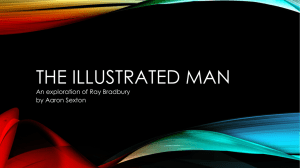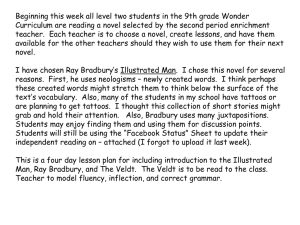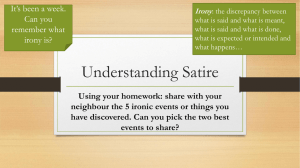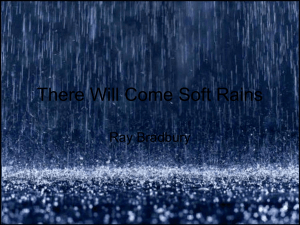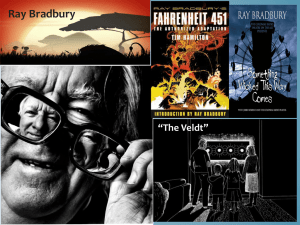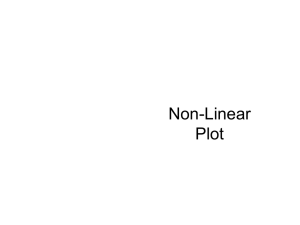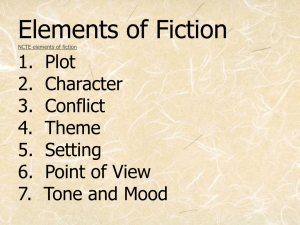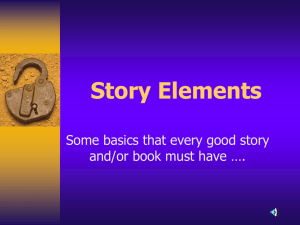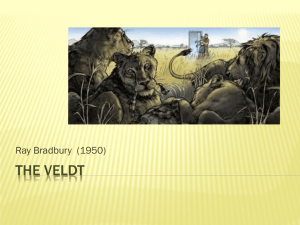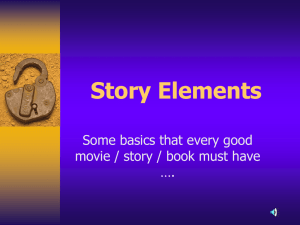The Veldt" Powerpoint
advertisement
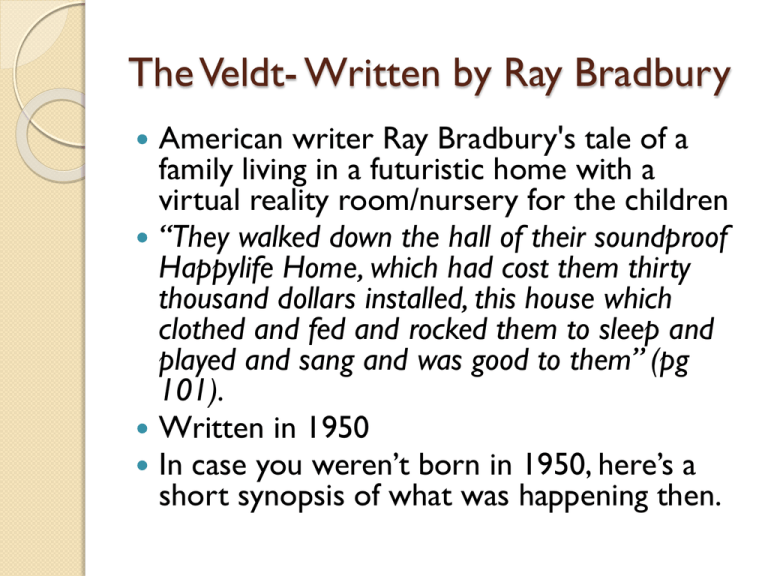
The Veldt- Written by Ray Bradbury American writer Ray Bradbury's tale of a family living in a futuristic home with a virtual reality room/nursery for the children “They walked down the hall of their soundproof Happylife Home, which had cost them thirty thousand dollars installed, this house which clothed and fed and rocked them to sleep and played and sang and was good to them” (pg 101). Written in 1950 In case you weren’t born in 1950, here’s a short synopsis of what was happening then. TVs were the Ipad’s of the 1950’s. Everyone wanted one Tv’s Just like today, when people debate the amount of time children spend with technology, in 1950 people were worried about the effects TV’s would have on children. At the time when Bradbury wrote The Veldt, he didn’t even have a TV, he refused to purchase one. (songfacts.com) 1950’s Westinghouse TV ad http://www.youtube.com/watch?v=wDsg4 P5HG6w When watching this ad, notice how they compare the new technology of the TV to magic. Cell phone technology hadn’t been mastered yet, but for those who could afford it there were rotary car phones. Deadmau5- The Veldt http://www.youtube.com/watch?v=_esYO NwdKuw Inspired by Bradbury’s short story Stephen Colbert reading The Veldt http://www.youtube.com/watch?v= KSoigRHHNLM st 1 Discussion With those at your table, talk about what we know so far. Share any “bookmark symbols” you’ve used. What is the main conflict, or problem in the story as told by Lydia Hadley? 2nd Discussion Predict what you think is going to happen next. Are there any hints in the text which might FORESHADOW events? Foreshadowing= A literary device used by the author to give readers an advanced warning about plot turns that may occur later in the story. For example: “The walls began to purr and recede into crystalline distance, it seemed, and presently and African veldt appeared” (102). This purring could be from the engines which work the walls, or it could be from the lions which are about to appear. End Discussion So what do you think happened? There is more than one theme in The Veldt. Let’s brainstorm a few… RESPONSE EXIT SLIP: 1. What do you think the author is trying to tell us? 2. What is his argument about technology in particular? 3. What is one piece of modern technology you would have trouble living without? Explain why it is so important to you. “The Veldt”- Plot Point of View Objective Point of View (OBSERVER) With the objective point of view, the writer tells what happens without stating more than can be inferred from the story's action and dialogue. The narrator never discloses anything about what the characters think or feel, remaining a detached observer. Third Person Point of View (FLY ON THE WALL) Here the narrator does not participate in the action of the story as one of the characters, but lets us know exactly how the characters feel. We learn about the characters through this outside voice. First Person Point of View (TOLD FROM A CHARACTER) In the first person point of view, the narrator does participate in the action of the story. When reading stories in the first person, we need to realize that what the narrator is recounting might not be the objective truth. We should question the trustworthiness of the accounting. Omniscient and Limited Omniscient Points of View (GOD LIKE) A narrator who knows everything about all the characters is all knowing, or omniscient. Limited omniscient gets into the head of only a few characters. Simpson’s Episode UltraHouse How is the Simpson’s episode similar to The Veldt? Give examples. In the Simpson’s episode, it is the house that makes the decision to kill Homer. Who makes the decision to kill the parents in The Veldt? Could an argument be made that the HappyLife Home also had a motive to kill the parents? Both the short story and the TV show have similar themes bout dependence on technology, but Bradbury is also saying something specific about children and the use of technology, what is it? In the Simpson’s episode and in the story, what is the author trying to say about family? List some of the technological advances that you saw in the Simpson’s movie/the story Respond to article or image Google “Technology dependence.” Option 1: Read an article and respond Option 2: Analyze a photo or cartoon and respond. E-mail your responses to : ddechantal@sd61.bc.ca Internet response Summarize or describe the important parts of the article/image Do you agree with this article’s or image’s message? Why/why not? What is one connection that you can make between this article/image and the story? What is one connection that you can make between this article/image and your life? I am looking for your ability to: 1. Compare/contrast the article/image with the story 2. Consider the big picture (what are the big ideas going on here?) 3. Clearly organize and present your thoughts Day 3: Paragraph Response •In “The Veldt,” there is a theme that a dependence on technology will not create the amazing society that many people believe it will. •The technology in this story is intended to make life easier; however, it causes more problems than it eases. Keep in mind: •This was written in the 1950s, when technology was not nearly as advanced as it is today. •Use the knowledge you gained from the image/article response last day. Some things to consider before choosing your position… Write a paragraph response that makes a case for or against Bradbury’s message. In other words, do you think that technology today adds to or takes away from the overall quality of life? Pro Technology Medical advancements Con Technology Invasion of privacy (hackers identity theft) Be sure to use specific examples from your life, from the book AND from the Simpson’s episode to support your argument. Personal Response Rubric Categories Knowledge/ Understanding Thinking Content Level 1 Shows limited knowledge of plot, characters, themes and conflicts Level 2 Shows some knowledge of plot, characters, themes and conflicts Level 3 Shows considerable knowledge of plot, characters, themes and conflicts Level 4 Shows in depth knowledge of plot, characters, themes and conflicts Does not explain connections between thoughts and text Shows some connections between their thinking and the text Explains relevance of thoughts to the story and makes clear connections to text Thought provoking connections are made to the text Information is not specific enough or off topic Does not contain sufficient reasons/example s to support main idea. Information is accurate, but simple. Some examples are used, but are basic and could be more specific. Information is accurate and focussed on the topic. Reasons, details and facts are all ontopic, specific and accurate. Information is original, interesting, ontopic. Many thoughtful reasons and examples are provided and build upon each other.


